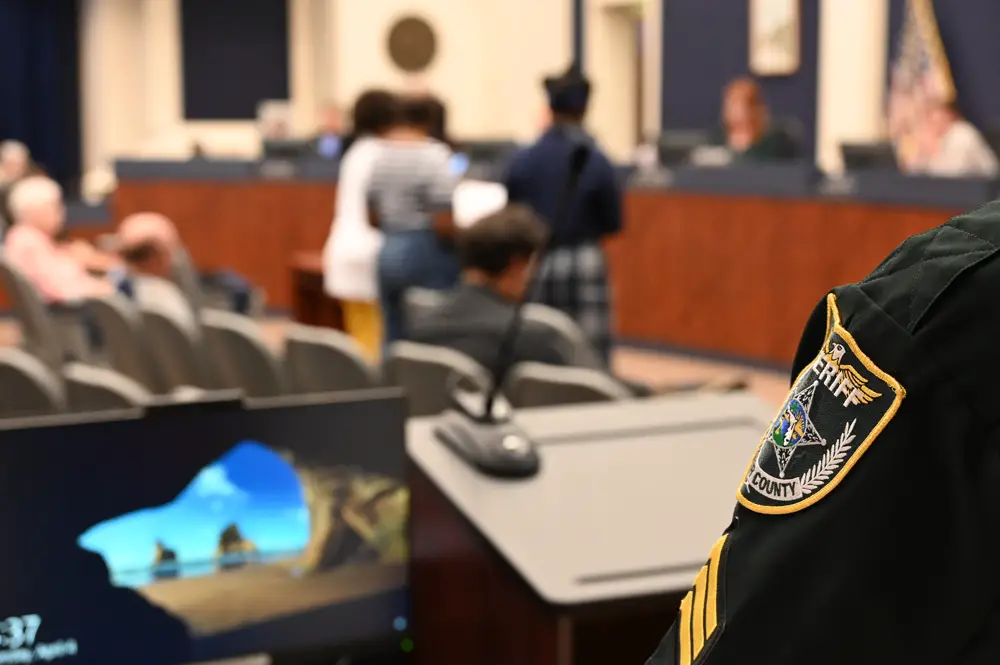
Flagler County School Board members and parents spoke of surprise, concern and “blindsiding,” in the words of the board’s chair, in reaction to a Feb. 13 letter from County Administrator Heidi Petito to the superintendent saying the county had reached “an important decision” to “gradually transfer the financial responsibility” for $1.4 million in “legacy expenditures to the school district,” including the county’s more than $1 million commitment to school resource deputies. (See: “Flagler County Plans to End $1.4 Million Contribution for School Deputies, Administrator Tells Superintendent.”)
For about a decade, the County Commission and the school board have agreed to split the cost of school resource deputies roughly 50-50. The agreement was solidified in the aftermath of the Parkland school massacre, when the Legislature made it mandatory that schools have at least one armed individual on each campus, and when then-Superintendent Jim Tager, Sheriff Rick Staly and the county agreed to keep funding deputies, even in larger numbers. There are now 14 deputies at the district’s nine traditional schools and at Rise Up, its alternative school. (See: “Sheriff and Superintendent Pledge to Double School Deputies as They Outline New Normal Of Campus Security.”)
“Based on our records, we estimate these annual expenditures to be approximately $1,400,000,” Petito wrote Superintendent LaShakia Moore. “To facilitate this transition, we would like to schedule a meeting at your earliest convenience to discuss the specific details and timeline for transferring these expenditures to the school district.” There was no equivocation. There was no mention of this being just a discussion, or a starting point, or a mere consideration. Petito stated it as a done deal from the county’s end, and a “transition” to be accomplished by the district.
School Board members’ reactions were not surprising. “It definitely was a blindsiding moment because again, this had not been workshopped,” Will Furry, the board’s chair, said. “We really didn’t kind of know what was going on in their head. I can see why some of the public was confused and concerned, because it was written in a way that kind of made it seem almost like they’d made up their mind. So that was very concerning.”
Board member Christy Chong was more blunt. “I am confused about this letter as much as everyone else,” she said. “I don’t know how they came to this conclusion without a board meeting or a vote because I feel like it would be like the three of us just making a decision and not telling two other members or something. But the safety of our children is the utmost importance. I have children in school also and if they really have a $200 million budget and the first things they want to cut is safety for children, I find that so completely out of touch, and I condemn that action absolutely.”
Staly last year responded just as bluntly in a letter to the County Commission chairman at the mere suggestion that the county could pull back SRO funding. (See: “Sheriff Staly to County: ‘Defunding School Resources Deputies Is Fundamentally Wrong’.”)
Petito’s letter was the result of a December discussion by commissioners in the context of lowering the county’s property tax. The “legacy” contributions to the School Board were specific to spending on school deputies. It was not an elaborate discussion. There were brief references to county spending for school deputies by Commissioners Greg Hansen and Andy Dance, with more references to “legacy” spending by Dance.
But neither of them, nor any of their colleagues, went anywhere near saying they wanted to cut the funding so much as have discussions about the funding. They may have implied that it may be time to cut funding. There was no direction to do so. Dance put it this way: “We can start at least to understand better the constraints that the school district is under on any expenses with the resource deputies.” (See the segment here.)
There was a considerable amount parsing and walking back of the Petito letter when Dance and Commissioner Dave Sullivan were interviewed on Monday, and when they addressed whether there was consensus or not to cut funding later that evening at their meeting. In the interviews, Sullivan framed the Petito letter in the same terms Dance had used at the December meeting–as just opening a conversation with the district. Dance was more aligned with the letter to the extent that “there needs to be a transition plan,” as he put it, echoing some of Petito’s words. But neither said that there’d been a “decision” to end funding–as, in fact, there had not been, even though the letter said with clear finality that there had been. (See the letter in full here.)
Dance attempted to close the gap between the letter and the county’s intentions at Monday’s meeting. “I never in my mind thought we didn’t have consensus on that. We’ve never heard anybody object to us not looking at those expenses,” Dance said. But again: while there was consensus to “look” at the expenses, there was no consensus, no vote, to end the funding. So Dance’s clarification only went so far–or tried to have it both ways. It did not address the finality of Petito’s letter.
That left School Board members scratching their heads and parents and other constituents concerned.
“Not having the deputies in our schools really should not be an option,” Jessica Matthews told the School Board. “Our deputies are amazing. They’re there and it makes us as parents feel a lot safer sending our kids to school when we see the things that are happening. I’m a little disturbed that this letter was sent the day before the anniversary of the Parkland Marjory Stoneman Douglas situation, which I think was very untimely.” She said deputies in schools “need to be a mandatory thing,” whether the county pays its share or not. “We need our deputies and that’s the bottom line.”
Celia Pugliese, a Palm Coast business owner and a regular presence at Palm Coast City Council meetings, told the school board of the large proportion of county taxes Palm Coast residents pay, before speaking her bewilderment at the county’s suggestion that it would pull its funding for school deputies. “We need to do anything we can to prevent that,” she said. “We cannot have here this outsourced to private agencies because it won’t work. I only trust our sheriff on this, our law enforcement.”
Board member Cheryl Massaro had attended Monday’s County Commission meeting. She was going by what commissioners were saying, not what the Petito letter was saying. “This is nothing more than a starting point. They’re not demanding they’re not going to pay, and we certainly don’t want to get rid of our SROs,” Massaro said, using the acronym for school resource officers.
She said the county’s concern is based on a fear that the Legislature would increase the homestead exemption by an additional $25,000, resulting in a drop in county tax revenue. But that’s a very long shot that will not affect the next two years’ budgets, even if it were to become reality. For it to be reality, legislators would have to approve a bill that would place the proposal on a referendum–itself a long shot: the bill, attempted in past years, has not been very successful so far. Then the referendum would have to clear a 60 percent approval threshold. Either way: Petito’s letter made no mention of that context.
“I want y’all to relax and realize that our SROs are important to our our schools and our kids and our staff, and we love our SROs. We’re not getting ready to get rid of them in any way,” Massaro said. But, she said, school deputies are expensive and “much more valuable than guardians,” whose role is limited to reacting to an active shooter, while deputies “help maintain stability in all of our schools.” So-called “guardians” are the armed, civilian school employees that the state has authorized in the aftermath of Parkland, but with very limited funding, dubious standards and zero transparency.
Furry disputed Dance’s reference to the resource deputy funds as “legacy” projects. “I really see them more as investments in the future,” he said.
Board member Colleen Conklin, the member most familiar with the school deputy contracts over the years, was oddly circumspect about the issue, both in her brief comments at the board meeting and, earlier, in answers to a reporter’s question, repeating the same thing: “We don’t know all of the information at this point in time. All we’ve done is received a letter.”
“We’re not cutting that those dollars,” Conklin said. “We’re not making the decision to cut those dollars. We value our SROs so I’m sure we’ll work through this and everything will just be just fine.”
It so happened that one of the School Board’s proclamations Tuesday evening, which drew no audible complaints from Board member Sally Hunt, was Crossing Guard Appreciation Day. Guards are not paid much, $127,000 a year for nine part-time crossing guards, or less than the cost of a single school resource deputy (including equipment and training costs.) So the board makes up for it with an annual “appreciation,” or occasionally gives guards small gifts. The crossing-guard appropriation is part of the district’s contract with the Flagler County Sheriff’s Office for the $1.06 million it pays for school resource deputies. The county pays an equivalent amount for its share.
“They do a fantastic job,” Flagler County Sheriff’s Chief Dave Williams said of crossing guards, “and if you think about the conditions under which they work, the weather, hot, cold rain, shine, most of them are a little up there in age, you really have to commend the job that they do. Nothing is more important than keeping our children safe. And especially with the increase in traffic and citizens that have moved here to Flagler County, the school zones are getting busier. So they really do a commendable job.”
He could have been speaking of SROs–as indeed school administrators and parents often do.
Moore, the superintendent, said safe schools are “a shared commitment,” and that she will have a “collaborative” conversation with Petito on Feb. 28, describing SROs as “so much more than just safety.”
A single mother of two children in Flagler schools, who said her children spend more time in school than awake time with her, wondered as she addressed the board Tuesday: “Are they not worth protecting? You also have to understand, this is the generation that’s going to take care of us, and we can’t take care of them?” She spoke of what has now become the everyday anguish of parents with children in schools: “I don’t want to get a phone call or an email hours after something happens that could have been prevented possibly, when you know there’s incidents that happen all the time. My daughter’s in middle school. Do you know how many incidents I get an email about that I don’t even know about till hours later? If there’s a resource officer there, what’s going to happen when there’s not one there?”










